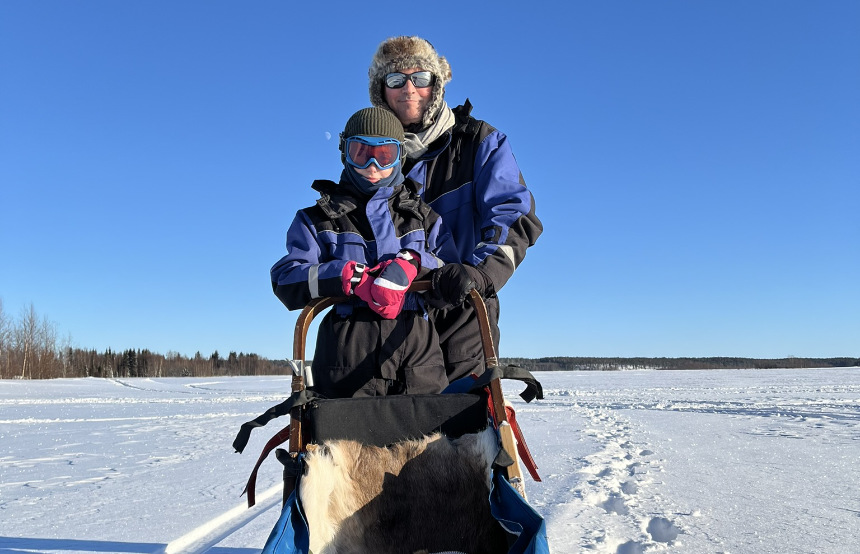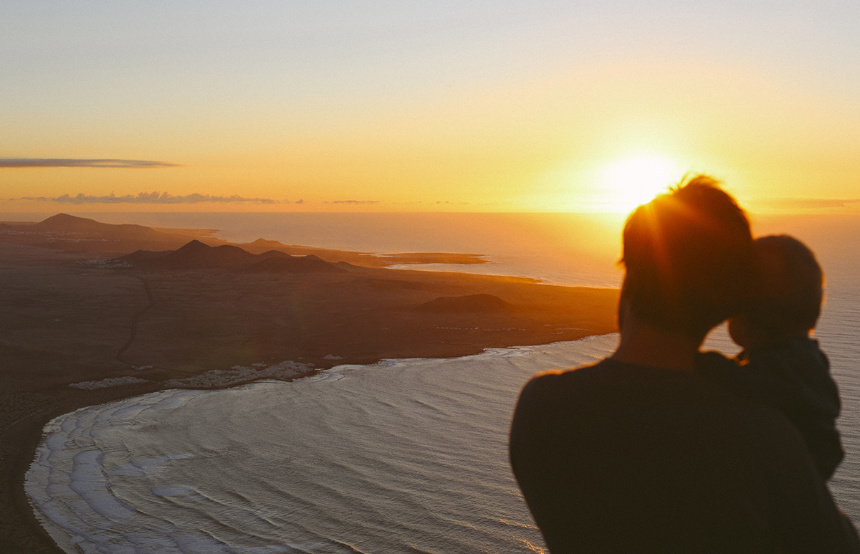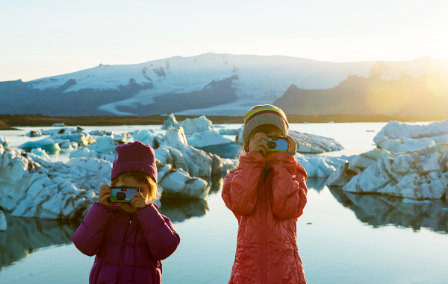
Published 14th Nov. 2025
Reading time
Sometimes, all we want is to go on holiday with the sole purpose of lying on the beach and reading a good book. There’s nothing wrong with that – holidays are for rest and relaxation after all – but they’re also a great chance to dive into the culture of a new country and try something completely different to what you’re used to at home. When you’re travelling with children you’ll want to soak up every minute with them, so why not embrace a busier schedule and experience new things along the way?
Experiential family travel can bring excitement, adventure and learning opportunities to your holiday, keeping both children and adults happy. With the right itinerary, a holiday becomes far more than simply a chance to rest and reset; it’s an opportunity to make lifelong memories as a family and learn something new, too. Who knows – for little ones, it might even spark a passion for something they’ll continue with back home.
But what exactly is experiential learning? And why would you want to include it in your holiday plans? In this blog, we answer both of these questions, as well as exploring some of the best destinations and activities for learning while on holiday.
Experiential learning is all about getting hands-on and interactive. Instead of reading a book or watching a video about something, children are encouraged to get involved with an activity and learn for themselves, as well as reflecting on it afterwards to see what they’ve learnt. Some of the best experiential activities for curious children allow them to ask questions, which shouldn’t be difficult, as every parent knows that ‘but why?’ is a favourite of little ones…
In your daily home life, this might mean using building blocks to learn about construction, or role-playing a supermarket scenario to learn about money. But travelling abroad brings with it a chance for children to step away from the ordinary and immerse themselves in cultural, ecological and historical experiences that bring the destination they’re visiting to life. We’ll share some more examples later, but for starters, imagine having the chance to learn to make pasta in Italy, or dress up as a knight in a castle in France. Not only are these learning experiences, but they’re also something that little ones will love to take part in and talk about when they get home.

Image by Getty Images / iStockphoto
We’ve covered what experiential learning is – but why is it important? And why should you make room for it on your family break? Let’s take a look at some of the benefits of experiential learning for children (especially on holiday).
The world is an amazing place, and one of the benefits of travelling abroad is getting to see new things that your children (and you) wouldn’t experience at home. Exposure to different surroundings, new activities and new food can all foster a sense of curiosity in children and a willingness to try new things.
Experiential activities are one of the best ways to do this, as they make the learning process fun – little ones might refuse a new dish when it’s put in front of them, but get them involved in making it, and they’ll likely find snacking as they cook hard to resist... Historical re-enactments are another great example of this; reading about a battle in a book might seem a dry subject matter to children who would prefer to run around, but watching actors ‘battle’ in the ruins of a castle? A lot more engaging, for all of their senses.
Travelling abroad can be a big leap out of their comfort zone for many families. If you’re looking to take your first trip abroad, or perhaps are exploring a new continent, then there’s an element of not quite knowing what to expect.
It can be tempting to play it safe when you arrive, speaking in English, eating in popular tourist spots and booking private activities rather than interacting with a group. However, pushing yourself and your children out of your comfort zone and trying to interact with new people outside of your family group is a fantastic learning experience. Social skills are vital for children, and experiential activities are a fantastic way to meet different people and give your youngsters a chance to make new friends.
Starting a new hobby at home often feels like a big commitment, and there may not be a range of activities available in your area. This can limit the skills that children develop, or the variety of interests they have, simply because of availability.
Taking part in experiential learning activities on holiday gives youngsters a chance to try something totally different to their usual routine, in a bitesize version. If they don’t like it, there’s little lost, and if they love it, you can look into whether they can carry on back home. These trips abroad can spark lifelong interests that otherwise wouldn’t have been available. Who knows, maybe it will even inform their career path later down the line.

Image by Jess Vide / Pexels
Of course, experiential learning is a great chance to make new memories, both for children on their own and for you all as a family. Doing an activity together may even bring out a new dynamic – it’s good for children to see their parents trying something new and not necessarily be good at it. It’s a reverse from home, where you’re usually in charge; on holiday, you’re all learning together, with no pressure to be ‘good’. Everyone is stepping out of their comfort zone together.
Research by Miyakawa and Oguchi showed that families benefitted from an all-around skills increase after going on holiday together. Parents also showed an increase in overall wellbeing, and the researchers suggested that shared positive holiday memories help strengthen the family unit.
Now that we’ve discussed why experiential learning is so important, let’s look at some of the ways that you can build it into your next trip without it feeling like a chore. Here are seven activity ideas that can be applied almost anywhere in the world.
Food is a great way to teach children about other cultures and expand their horizons. However, it can be tricky to get little ones onboard with trying a dish that looks different to what they’re used to at home, even if the ingredients are similar. This can be especially true in countries in Asia, where the ingredients are often quite different to what you might be used to at home in the UK.
Cooking classes are a fantastic opportunity to get children involved in making popular dishes, helping them recognise those familiar ingredients and get over their nerves at tasting something new. On a practical note, it also means you don’t have to fork out for a whole dish at a restaurant that they may or may not eat – by working together to create something as a family, they should be much more likely to enjoy it. Plus, you’ll come away with a skill you can use again at home, alongside some fun memories of your foodie adventures.
Look out for classes that are particularly marketed as family friendly, to ensure that it’s suitable for children. Ones run by locals are particularly good, as you can usually find out some of the best spots to enjoy the cuisine after the class is done.
Nothing makes history fun like turning it into an interactive activity. Events that can seem dry when children read about them in a book or see a display at a museum, can come alive when they’re recreated by actors, or when your youngsters can play dress-up and get involved.
Many castles and historic houses offer these sorts of activities, so look at what's available before your trip – there may well be sessions in English in popular tourist destinations such as France, which is famous for its castles that are steeped in history. Even if there’s a language barrier, it often doesn’t matter when you can all watch the action unfolding. Whether it’s watching knights joust, seeing a bird of prey display, or getting to try on some medieval outfits, historic sights are some of the best places to combine learning with fun.

Image by Olivier Romano
Experiential learning doesn’t need to cost anything extra. One of the best ways to teach children about the destination you’ve chosen for your holiday is to get outside and get close to nature. They can learn so much by seeing the landscape, listening to the noises around them and feeling the difference in the air in comparison to home.
Whether or not your child will enjoy going on a hike is a question only you can answer. If they need a bit of encouragement, why not make it a game? Creating a scavenger hunt, or taking a list of birds and bugs they need to spot along the way can make it more enjoyable, and help them learn without even realising it. You can look up local flora and fauna online for inspiration.
This might feel like a summer activity, but it doesn’t have to be. Mountainous countries such as Switzerland are even more enchanting in autumn and winter, as the seasons visibly change. Just make sure you’ve got the right outdoor gear on before you set off, and only hike within your abilities.
Crafting is a fantastic way to keep children entertained and fuel their creativity. It can help little ones express themselves and document the important parts of their holiday – whether that’s drawing a picture of some of the animals they’ve seen, making a bracelet from local materials, or constructing nature art from items they’ve found on a walk. Museums are also a good way to access craft activities, with many offering art stations for children or group craft sessions during high season.

Image by Carol Sachs
There’s something inherently fun about a lot of science experiments – watching ingredients froth up, building a track for a ball to roll down, blowing bubbles big enough to stand inside, the list goes on. But at the heart of all the fun are some practical lessons in how the world works, ensuring that your children are expanding their science knowledge without really realising it.
Additionally, while you might not consider them science museums, botanical gardens are another great place to visit. Many major cities in Europe have a botanical garden that’s open to the public, so they’re an easy activity to fit in if you find yourself with a spare sunny day.
Children can spot all different sorts of plants that they might not see at home, and there are often some unusual-looking species which should delight any youngsters who quickly grow bored of looking at leaves and flowers. These gardens are also a fantastic chance to teach children about sustainability and the importance of protecting the natural world, something that’s more important now than ever.
A key part of experiential learning is reflecting on what you’ve seen and how it made you feel. Children experience a lot of different emotions as they grow, often in quick succession, so it can be helpful for them to have a way to write down what they’ve seen and done in the day in order to process it. Keeping a holiday journal is a fantastic learning tool, but it’s also a chance for children to have a keepsake and lasting memento of their trip.
To make this fun, rather than a chore, let your child choose a book and pens that they like before you travel – you could add stickers, or take some glue and stick in leaflets or tickets from the trip. It can help it feel less like homework if you also keep a journal, so that you all sit down as a family and share this activity together.
-body.jpg)
Image by Claire Guarry
Holidays are a time to literally and metaphorically expand your horizons. Travelling to a new place is a chance to try out a new activity, whether that’s trying out watersports, playing tennis, going to a children’s dance or Zumba class, or riding a horse for the first time. It could be as simple as playing table tennis at the hotel – the new skill doesn’t need to be big to be impactful.
Not only will learning a new skill give your child a physical benefit, but it will boost their mental growth too. They’ll feel more confident, and have a sense of pride that they’ve managed to make progress with whatever they’ve tried out.
Hopefully, this short guide has shown you just how easy it can be to incorporate experiential learning activities into your holiday. As well as providing a fun itinerary for the whole family to get involved in and enjoy, you’ll also be boosting your children’s development – there’s surely no better reason to get booking your next trip.
Practical advice and inspiration for your next trip

This blog is a love letter to a type of holiday I can't recommend enough – the Bonding Holiday. At its heart is a simple belief: shared experiences strengthen relationships. These are trips where just two family members travel together – parent and child, grandparent and grandchild, godparent and godchild. The best ones revolve around a shared interest – art, music, wildlife, food, history – and the aim is beautifully straightforward:
15th December 2025 - Family Travel

Travel has many benefits, from immersing yourself in another culture to escaping the burdens of daily life, all while allowing you to learn and evolve. Many travellers are now looking to extend these positive impacts to their entire clan, with multi-generational travel emerging as an increasingly popular way to see the world. This takes the concept of a traditional holiday and broadens horizons so that every generation of your family is included.
7th November 2025 - Family Travel

What if, in addition to making happy memories, children came back from their holidays having learned something new? How to light a fire, create an authentic Neapolitan pizza, identify a paw print. Holidays are an amazing opportunity for children to interact with, and learn about, the world around them – often without even realising it. Welcome to ‘Stealth Learning’. Whether it’s studying constellations with an astronomer in Chile’s Atacama Desert,
26th February 2025 - Family Travel

Our team of destination experts will get to know you and your unique requirements for your holiday

We work with you to build an ultra-personalised holiday itinerary with your choice of accommodation, experiences and activities

All of our holidays include little extras designed to make a big difference to your trip, from fast-tracking you through airport check-in and security to our network of local Concierges